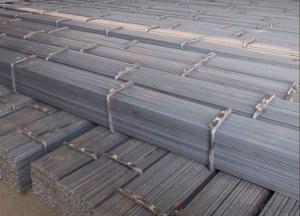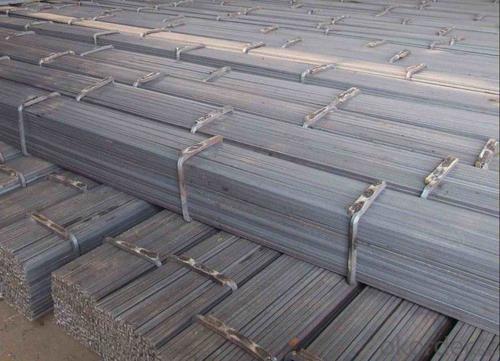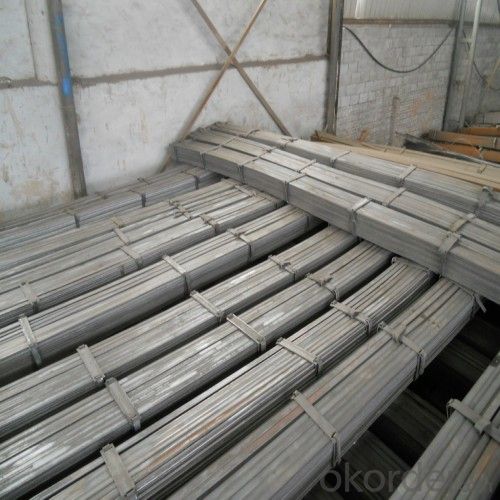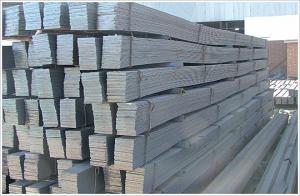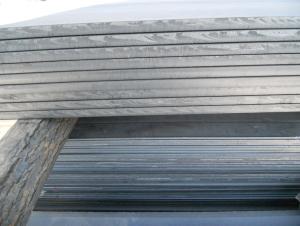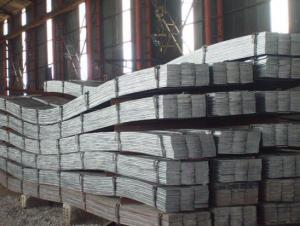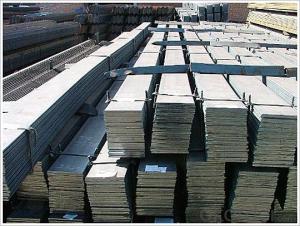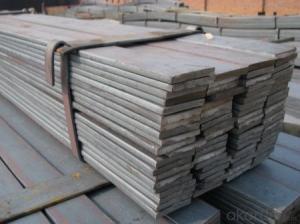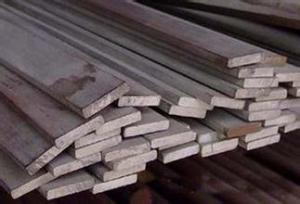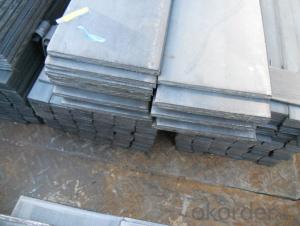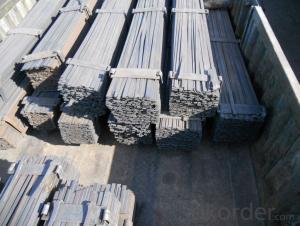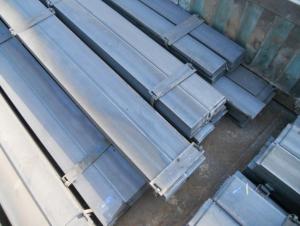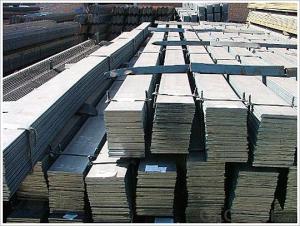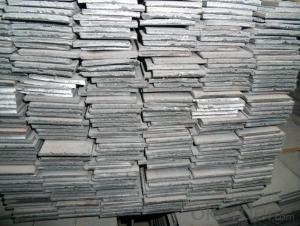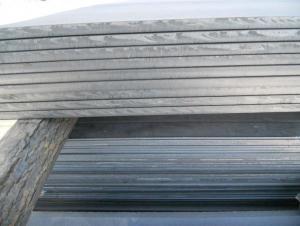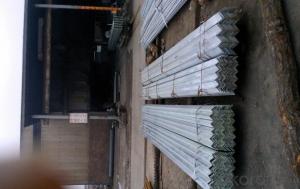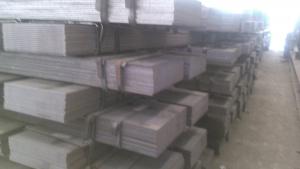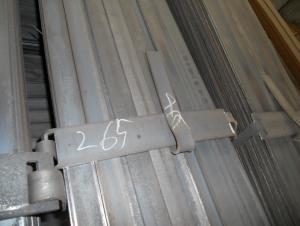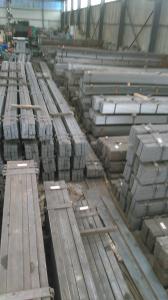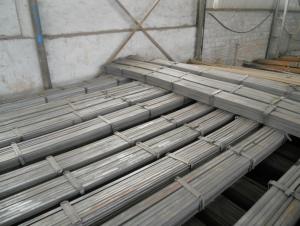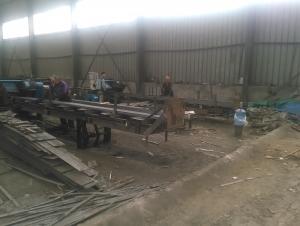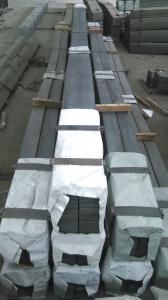Low carbon steel flat bars with high quality and good price
- Loading Port:
- Tianjin
- Payment Terms:
- TT OR LC
- Min Order Qty:
- 25 m.t.
- Supply Capability:
- 100000 m.t./month
OKorder Service Pledge
OKorder Financial Service
You Might Also Like
Mild Steel Flat Bar Details:
| Minimum Order Quantity: | 25 m.t. | Unit: | m.t. | Loading Port: | China Main Port |
| Supply Ability: | 80000-100000MTS/YEAR m.t./month | Payment Terms: | TT or LC |
Product Description:
Specification of Mild Steel Flat Bar
Commodity: Mild Steel Flat Bar
Standard: GB;JIS
Material: Q195-235;SS400
Brand name: FLATSPACE
Origin place: China
Thickness: 3mm-30mm
Width:20mm-200mm
Length: Max 12m
Certification: SGS/BV
Chemical composition of Q235
Alloy No | Grade | Element(%) | ||||
C
| Mn
| S
| P
| Si
| ||
Q235
|
B
|
0.12—0.20 |
0.3—0.7 |
≤0.045 |
≤0.045
|
≤0.3
|
Physical properties of Q235
Alloy No | Grade | Yielding strength point(Mpa) | Tensile strength (Mpa) | Elongation after fracture(%) | ||||||
Thickness (mm) | Thickness (mm) | |||||||||
≤16 | >16--40 | >40--60 | >60--100 | ≤16 | >16--40 | >40--60 | >60--100 | |||
≥ | ≥ | |||||||||
Q235 |
B |
235 |
225 |
215 |
205 |
375--500 |
26 |
25 |
24 |
23 |
Usage/Applications of Mild Steel Flat Bar
Widely used for construction, Machinery manufacturing, Iron tower steel structure, Shipbuilding; Steel grating, Staircase, Bridge, Viaduct, Railway spare parts, Boilers making etc.
Packaging & Delivery of Mild Steel Flat Bar
Packaging Details: The Mild Steel Flat Bars are packed in bundles and loaded in 20 feet/40 feet container, or shipped by bulk cargo ,also we can do as customer's requirements.
Delivery Details:30~45 days upon the receipt of buyer payment by T.T. or L/C.
Production Flow of Mild Steel Flat Bar
The Mild steel flat bar is made through three processes:
1.Feeding the material: Feeding the row material (the steel plate) to Slitting Line.
2.Slitting:The steel plate would be slitted into expected width by lengthways cutter.
3. Leveled and cutting: The plat bar would be ground into level by the grinder and then cut into required length.
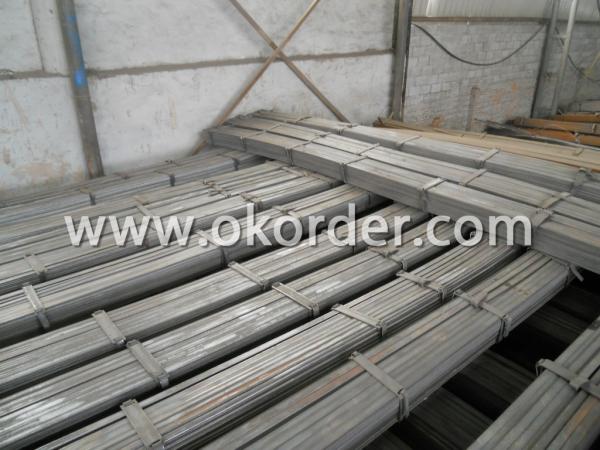
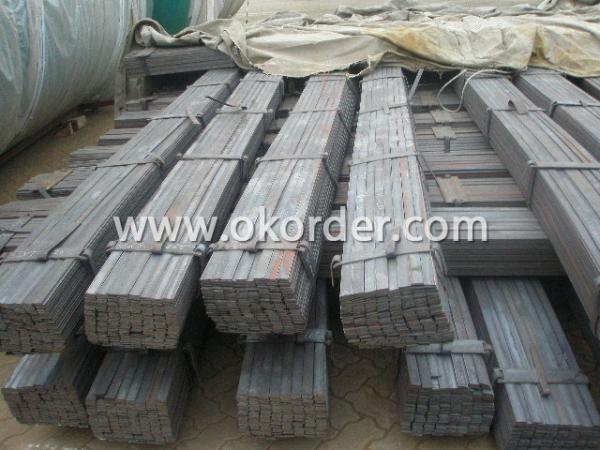
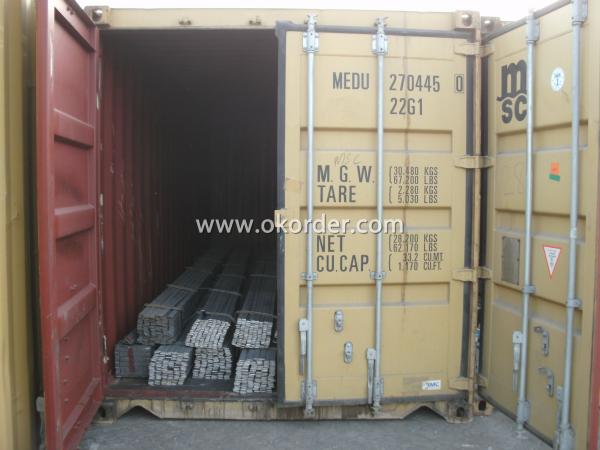
FLATSPACE is specialized in production and sales of slit flat bars. We offered the individuation processing service of slitting and crosscut. Our flat bar the width form 10mm to 1800mm, and thichness from 2.5mm to 25mm.
View Manufacturer's Shop
1. Manufacturer Overview | |
|---|---|
| Location | Hebei, China |
| Year Established | 2009 |
| Annual Output Value | Above US$ 150 Million |
| Main Markets | Southeast Aisa, Middle east, Africa |
| Company Certifications | |
2. Manufacturer Certificates | |
|---|---|
| a) Certification Name | |
| Range | |
| Reference | |
| Validity Period | |
3. Manufacturer Capability | |
|---|---|
| a)Trade Capacity | |
| Nearest Port | Tianjin |
| Export Percentage | 70%-80% |
| No.of Employees in Trade Department | 10-15 people |
| Language Spoken: | English; Chinese |
| b)Factory Information | |
| Factory Size: | Above 20,000 square meters |
| No. of Production Lines | 7 |
| Contract Manufacturing | OEM Service Offered; |
| Product Price Range | Average |
- Q: Can steel flat bars be used for support beams or columns?
- Steel flat bars can serve as support beams or columns in construction due to their strength and durability. Their ability to provide structural support and stability makes them commonly used in the industry. Nonetheless, it is crucial to assess the project's specific requirements and load-bearing capabilities before utilizing steel flat bars for such purposes. Seeking advice from a structural engineer or construction professional is advised to guarantee the suitability of the steel flat bars for the intended use and compliance with safety standards.
- Q: What are the different types of surface defects in brass steel flat bars?
- There are various types of surface defects that can be found on brass steel flat bars, which can occur during the manufacturing, processing, or handling of the material. Some common surface defects in brass steel flat bars include the following: 1. Scratches: Shallow marks or abrasions on the surface of the flat bar that can be caused by mishandling, contact with sharp objects, or improper storage. These scratches can affect the bar's appearance and potentially weaken its structural integrity. 2. Pitting: Small, localized cavities or depressions on the surface of the flat bar. Pitting can occur due to exposure to corrosive environments or chemical reactions. It can compromise the smoothness of the surface and may lead to further corrosion if not treated. 3. Rust or corrosion: When exposed to moisture, humidity, or aggressive chemicals, brass steel flat bars can develop rust or corrosion. Rust appears as a reddish-brown coating on the surface and can weaken the bar over time. Corrosion can also result in pitting or flaking of the surface. 4. Dents or dings: Small deformations or indentations on the surface of the flat bar. These defects can occur during handling or transportation, especially if the bars are not adequately protected. While dents may not significantly impact the structural integrity, they can affect the overall appearance. 5. Roll marks: Surface imperfections that occur during the rolling process used to shape the brass steel flat bars. These marks can appear as ridges, depressions, or patterns on the surface. Although they may not affect the functionality of the bar, they can impact its aesthetic appeal. 6. Scale: The layer of oxides that forms on the surface of brass steel flat bars during heating or high-temperature processes. Scale appears as a thin, flaky coating that can be easily removed mechanically. While scale does not affect the structural integrity, it can impact the surface finish. It is important to understand that the severity of surface defects can vary, and the acceptability of certain defects depends on the specific application or industry standards. Regular inspection, proper handling, and appropriate surface treatment methods can help mitigate and prevent these surface defects in brass steel flat bars.
- Q: Are steel flat bars available in different colors?
- No, steel flat bars are not available in different colors. Steel is typically produced in its natural grey color, which is the result of its composition and production process. However, it is possible to apply different coatings or paint to steel flat bars to change their color. These coatings can provide additional protection against corrosion or simply serve aesthetic purposes.
- Q: Can steel flat bars be used for making blades or cutting edges?
- Yes, steel flat bars can be used for making blades or cutting edges. Steel is a strong and durable material that is commonly used in the construction of various tools and equipment. When shaped and sharpened properly, steel flat bars can be transformed into effective blades or cutting edges.
- Q: What is the maximum length-to-width ratio for steel flat bars?
- The maximum length-to-width ratio for steel flat bars may vary depending on the specific manufacturing standards and requirements. However, in general, the length-to-width ratio for steel flat bars is typically around 6:1. This means that the length of the bar can be up to six times its width. It's important to note that this ratio may be subject to variations depending on the specific application or industry standards.
- Q: How do steel flat bars perform in terms of strength and durability?
- The exceptional strength and durability of steel flat bars are well-known. Steel, with its unique properties, gives flat bars high tensile strength, enabling them to withstand large amounts of force without bending or breaking. This quality makes them perfect for applications that necessitate structural support or load-bearing capabilities. In addition, steel flat bars also possess outstanding durability. They have a high resistance to corrosion, which is a primary factor that weakens and damages metals over time. This corrosion resistance makes steel flat bars suitable for both indoor and outdoor use, even in harsh environments. Moreover, steel flat bars can endure extreme temperatures without compromising their strength. They are highly resistant to heat, making them suitable for applications involving high temperatures, such as construction, manufacturing, and machinery. Furthermore, steel flat bars are versatile and can be easily fabricated and machined into various shapes and sizes, making them suitable for a wide range of applications. They can be welded, bent, drilled, and cut, allowing for customization and adaptability to meet specific project requirements. In conclusion, steel flat bars are renowned for their exceptional strength and durability, making them a popular choice in diverse industries, including construction, automotive, manufacturing, and infrastructure. Their ability to withstand heavy loads, resist corrosion, and adapt to different conditions make them a reliable and long-lasting option for numerous applications.
- Q: Are steel flat bars suitable for indoor applications?
- Yes, steel flat bars are suitable for indoor applications. They are commonly used in various indoor settings such as construction, furniture manufacturing, and interior design due to their strength, durability, and versatility.
- Q: What do the numbers in the steel HN346*174*6*9 refer to?
- I-beam, channel and angle steel are widely used in industrial buildings and metal structures, such as factories, bridges, ships, agricultural machinery, vehicle manufacturing, transmission towers, transport machinery, often in conjunction with the use of. Flat steel is used as a bridge, a housing, a fence, a transmission ship, a vehicle, etc. on a construction site. Round steel and square steel are used for all kinds of machine parts, agricultural machinery parts, tools and so on.
- Q: How do steel flat bars perform in terms of fire resistance?
- Steel flat bars have a high fire resistance due to their inherent non-combustible nature. They retain their structural integrity and do not contribute to the spread of fire, making them a reliable choice in fire-prone environments.
- Q: Are steel flat bars suitable for the construction of bridges or flyovers?
- Yes, steel flat bars are suitable for the construction of bridges or flyovers. Steel is a versatile and durable material that offers high strength-to-weight ratio, making it ideal for structural applications such as bridges and flyovers. Steel flat bars provide stability and support for the bridge or flyover structure, and their flat surface allows for easy welding and connection to other components. Additionally, steel is resistant to corrosion, which is crucial for structures exposed to outdoor environments and varying weather conditions. Overall, steel flat bars are a reliable and commonly used material in the construction of bridges and flyovers due to their strength, durability, and ease of use.
Send your message to us
Low carbon steel flat bars with high quality and good price
- Loading Port:
- Tianjin
- Payment Terms:
- TT OR LC
- Min Order Qty:
- 25 m.t.
- Supply Capability:
- 100000 m.t./month
OKorder Service Pledge
OKorder Financial Service
Similar products
Hot products
Hot Searches
Related keywords
